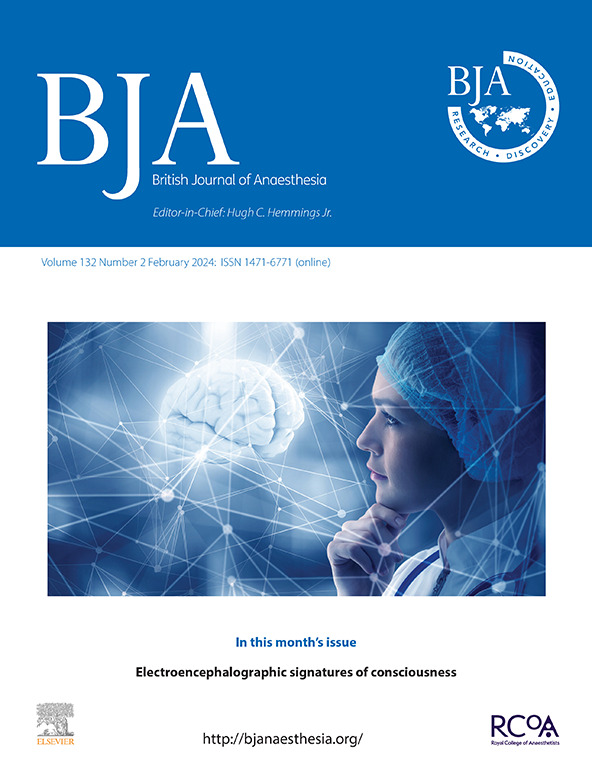围手术期虚弱:来自SNAP-3的经验教训。
IF 9.2
1区 医学
Q1 ANESTHESIOLOGY
引用次数: 0
摘要
第三个Sprint国家麻醉项目(SNAP-3)是英国最大的前瞻性多中心研究,旨在研究虚弱、多病和谵妄对60岁以上患者术后结局的影响。SNAP-3在214家国家卫生服务(NHS)医院进行,于2022年3月在5天内招募了7134名手术患者。研究人员使用多种工具,包括临床虚弱量表(CFS),确定了五分之一的患者虚弱。虚弱在急诊手术和社会经济贫困人群中尤为普遍。三分之二的患者存在多重发病,但仅部分与虚弱重叠。虚弱与住院时间延长、谵妄、并发症和死亡率密切相关,不良后果随着CFS评分的升高而加剧。相反,多病(无虚弱)与大多数不良结果的关联有限。有向无环图指导因果分析,但假设虚弱和多病是独立的,研究人员可能低估了多病的影响。SNAP-3强调了常规围手术期虚弱筛查、全面围手术期服务和劳动力发展的必要性。这些数据为服务规划和支持以脆弱为重点的护理的优先次序提供信息,特别是在高负担专科和贫困地区。本文章由计算机程序翻译,如有差异,请以英文原文为准。
Frailty in the perioperative setting: lessons from SNAP-3
The third Sprint National Anaesthesia Project (SNAP-3) is the largest prospective, multicentre UK study to examine the impact of frailty, multimorbidity, and delirium on postoperative outcomes in patients aged ≥60 yr. Conducted across 214 National Health Service (NHS) hospitals, SNAP-3 enrolled 7134 surgical patients over 5 days in March 2022. The investigators identified frailty in one-fifth of patients using multiple tools, including the Clinical Frailty Scale (CFS). Frailty was especially prevalent in emergency surgery and socioeconomically deprived populations. Multimorbidity was present in two-thirds of patients but only partially overlapped with frailty. Frailty was strongly associated with increased length of stay, delirium, complications, and mortality, with adverse outcomes escalating with higher CFS scores. In contrast, multimorbidity (without frailty) had limited association with most adverse outcomes. Directed acyclic graphs guided causal analysis, but by assuming frailty and multimorbidity were independent, the investigators might have underestimated the impact of multimorbidity. SNAP-3 highlights the need for routine perioperative frailty screening, comprehensive perioperative services, and workforce development. The data inform service planning and support prioritisation of frailty-focused care, especially in high-burden specialties and deprived areas.
求助全文
通过发布文献求助,成功后即可免费获取论文全文。
去求助
来源期刊
CiteScore
13.50
自引率
7.10%
发文量
488
审稿时长
27 days
期刊介绍:
The British Journal of Anaesthesia (BJA) is a prestigious publication that covers a wide range of topics in anaesthesia, critical care medicine, pain medicine, and perioperative medicine. It aims to disseminate high-impact original research, spanning fundamental, translational, and clinical sciences, as well as clinical practice, technology, education, and training. Additionally, the journal features review articles, notable case reports, correspondence, and special articles that appeal to a broader audience.
The BJA is proudly associated with The Royal College of Anaesthetists, The College of Anaesthesiologists of Ireland, and The Hong Kong College of Anaesthesiologists. This partnership provides members of these esteemed institutions with access to not only the BJA but also its sister publication, BJA Education. It is essential to note that both journals maintain their editorial independence.
Overall, the BJA offers a diverse and comprehensive platform for anaesthetists, critical care physicians, pain specialists, and perioperative medicine practitioners to contribute and stay updated with the latest advancements in their respective fields.

 求助内容:
求助内容: 应助结果提醒方式:
应助结果提醒方式:


